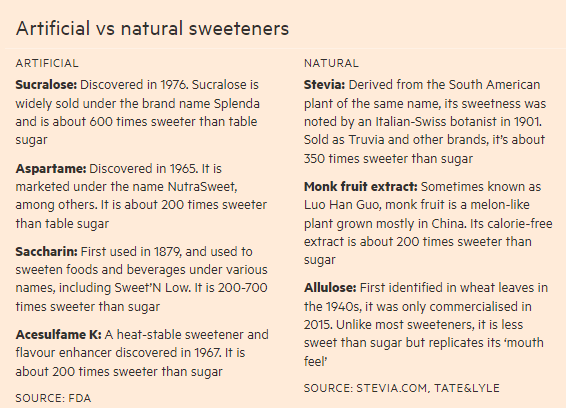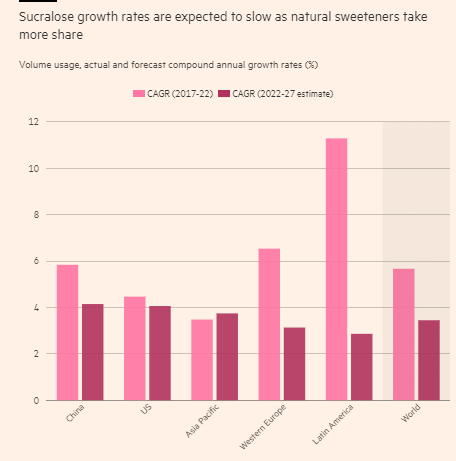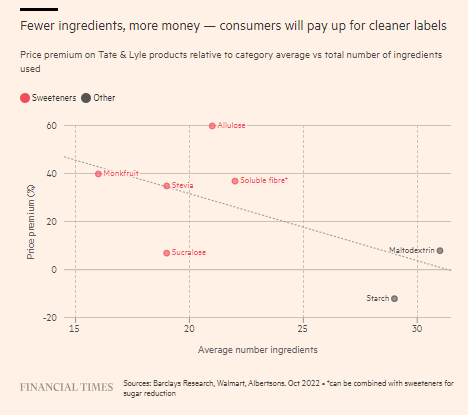Recent warnings are the latest in a series of scares, but the industry says sugar substitutes remain a vital weapon against obesity and diabetes
This is an Executive Summary of the article “Artificial sweeteners: the health controversy that will not go away”, published on the Financial Times, on September 30, 2023, and authored by Sarah Neville and Madeleine Speed;
This executive summary provides insights into the ongoing health controversy surrounding artificial sweeteners. It highlights the latest research findings, uncertainties, and their implications for consumers and the food industry.
Points:
- Impact on Health: Recent research, such as Professor Dana Small’s study, suggests that artificial sweeteners may have unexpected effects on metabolism and health, challenging the perception that they are a safe alternative to sugar.
- Changing Landscape: The rise of artificial sweeteners in response to sugar taxes and cost-cutting by food and beverage companies has brought questions about their safety and long-term impact to the forefront.
- Historical Concerns: Concerns about the safety of artificial sweeteners date back to the late 19th century, and they have periodically resurfaced. Notably, saccharin was linked to bladder tumors in rats in 1977, leading to a lengthy controversy.
- Recent WHO Recommendations: In May, the World Health Organization (WHO) recommended caution, suggesting potential undesirable effects, including an increased risk of type 2 diabetes, cardiovascular diseases, and mortality in adults from long-term use of non-sugar sweeteners (NSS).
- Gut Microbiome Impact: Emerging research, like Jotham Suez’s study, reveals that artificial sweeteners can alter gut bacteria, potentially impacting blood glucose levels and metabolic health. Individual susceptibility to these effects varies.
- Consumer Perception and Industry Response: Consumer preferences are shifting towards natural sweeteners, driving companies to reformulate their products. Manufacturers argue that artificial sweeteners are safe when used in small doses.
- Safety Assessment: The International Sweeteners Association maintains that all low or no-calorie sweeteners undergo thorough safety assessments by regulatory authorities.
- Public Health Perspective: Proponents argue that it’s unrealistic to expect people to completely avoid sweetened products, especially in the context of obesity and non-communicable diseases.
Arguments:
- Research Uncertainty: The executive summary underscores the need for further research on artificial sweeteners’ effects on human health, given the complexity of various sweeteners and individual responses.
- Balancing Act: The balance between reducing sugar intake and the potential risks of artificial sweeteners remains a challenge for policymakers, manufacturers, and consumers.
- Industry Shift: Food companies are increasingly turning to natural sweeteners and exploring innovative solutions to reduce sugar content while maintaining taste and texture.
Statistics:
- Data from various studies indicating the potential health impacts of artificial sweeteners.
- The widespread use of artificial sweeteners in over 3,000 foods.
- Growth in the consumption of sweeteners, particularly among children, following stricter food advertising and labeling rules in some countries.
Examples:
- The case of PepsiCo switching from aspartame to stevia in Diet Pepsi due to consumer concerns.
- The development of sugar-reduction technologies like Nestlé’s enzymatic process.
- The role of fiber in replacing sugar in certain products while adding “high in fiber” claims to labels.
In conclusion, the executive summary highlights the ongoing debate surrounding artificial sweeteners’ safety and their role in public health. It emphasizes the need for continued research to understand their effects fully and underscores the complex choices facing both consumers and the food industry.







